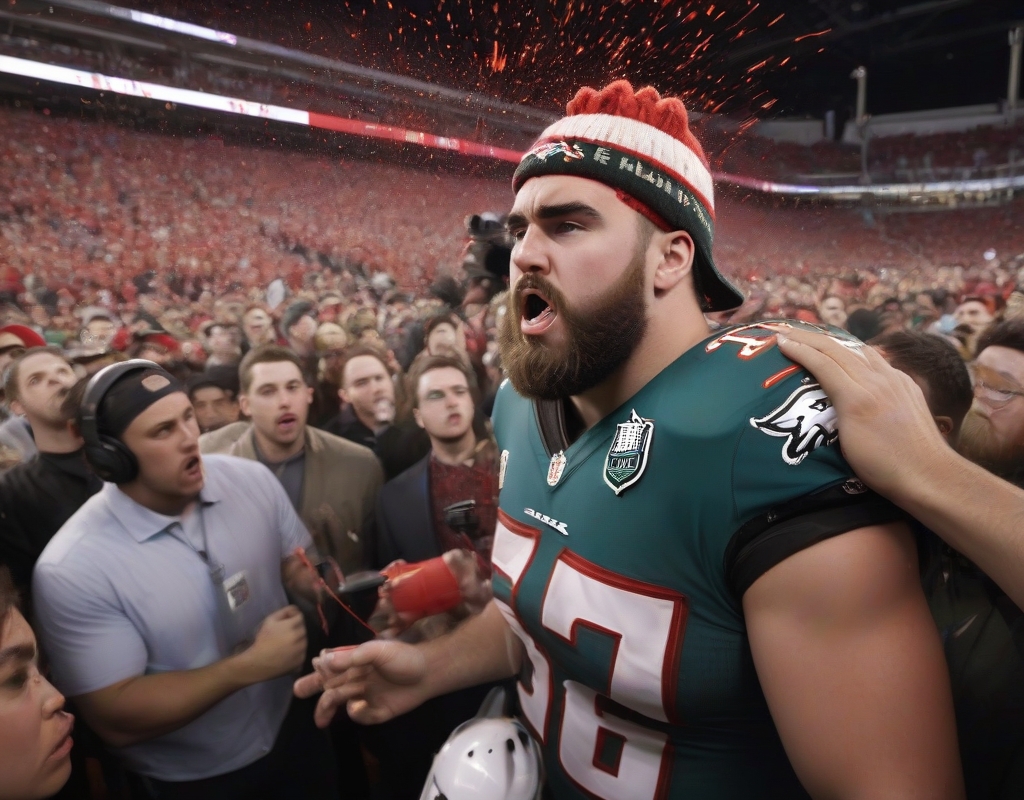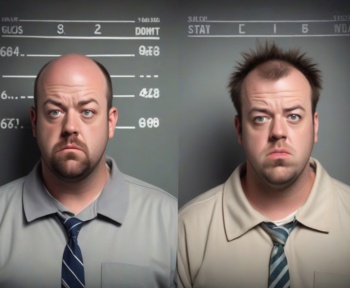The recent incident involving Jason Kelce, the former NFL star and sports commentator, has ignited a fiery debate that straddles the realms of sports, celebrity culture, and social issues. Kelce, who has always been perceived as charismatic and closely connected with fans, was involved in a contentious altercation during an event in Pennsylvania, prompting a broad discussion about the interface of personal and professional conduct when faced with provocative situations.
During this event, a situation escalated when an attendee hurled a derogatory slur aimed at Kelce’s brother, Travis, and his high-profile partner, Taylor Swift. This instance wasn’t just a mere exchange of words but a fiery nexus where sports met celebrity circles and broader societal attitudes toward LGBTQ+ slurs collided dramatically.
In a visible flare-up of temper, quite atypical to Kelce’s usual demeanor, he responded by grabbing and smashing the phone of the provocateur, an action that was caught on video and swiftly went viral. The footage displayed a visibly upset Kelce, juxtaposing the sound of the crashing phone against his usually composed public figure, offering a stark visual and auditory representation of his emotional state at that moment.
Reactions to Kelce’s actions were polarized and intense. Many fans and supporters within the LGBTQ+ community lauded him for his bold stand against bigotry, interpreting his reaction as a staunch defense of his family against unacceptable hate speech. On the other hand, some critics contended that Kelce’s aggression, displayed publicly, crossed ethical lines, prompting a discourse around the balance of emotional reactions and the expectations of public figures in maintaining composure.
The sports network that employs Kelce as a commentator, ESPN, found itself embroiled in the controversy, facing calls to address the incident. The absence of an immediate statement from the network has intensified scrutiny on how such situations are handled by employers in terms of public relations and ethical responsibilities.
The legal and investigative aspects of the incident are also under intense examination. Authorities are striving to pinpoint the identity of the individual who uttered the offensive slur. Meanwhile, legal experts and media analysts are debating the implications of capturing such incidents digitally, especially when the clarity and context of recorded actions can influence public and legal outcomes significantly.
Through dialogue with industry professionals and experts, it’s clear such confrontations highlight deeper societal problems, such as the pervasiveness of hate speech and the complex reactions they provoke. Past incidents involving public figures, from Colin Kaepernick to Serena Williams, provide context on how personal beliefs can clash with public and professional personas, driving heated debates and sometimes divisive public opinion.
Experts like Dr. Laura Gao, a renowned sports psychologist, suggest that public figures like Kelce operate under immense pressure, where split-second reactions can test one’s poise. “Navigating public confrontations requires robust support systems,” Dr. Gao notes, “given that these figures constantly face vitriolic interactions.”
Statistical insights reveal an ascending trend in public confrontations involving celebrities, underscoring the need for strategic guidance for high-profile individuals on managing public conflicts with finesse and ethical consideration.
The aftermath of the Kelce incident presents critical questions about the future impact on his career in sports commentating and his broader public image. The complex layers of public response reflect the nuanced nature of judgments faced by celebrities in such scenarios.
As the narrative unfolds, the repercussions for Kelce’s response become a litmus test for wider cultural discussions about handling hate speech and maintaining public civility. This case has become a pivotal moment in ongoing debates about the inclusivity of public spaces and the role of celebrities in championing social change.
Moving forward, this incident with Kelce could potentially set a precedent for how public figures might handle similar situations in the future, balancing personal indignation with public responsibilities. It also nods to a potential cultural pivot toward diminishing public instances of hate speech, influenced by high-profile reactions that command vast socio-cultural influence.
As the broader societal dialogue continues, the incident serves as a reflective mirror on societal progress and challenges, outlining the changing landscapes of how public figures are expected to navigate their platform responsibilities and personal integrity amidst provocations. The ongoing attention to this case will undoubtedly play a significant role in shaping Kelce’s legacy and future interactions within and beyond the sporting community.




